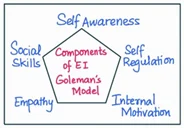Answer:
| Approach:
Introduction
- Definition of emotional intelligence.
Body
- Add components of EI.
- Mention the examples that illustrate the importance of emotional intelligence.
Conclusion
- Conclude by relevant statements
|
Introduction:
Emotional intelligence refers to the ability to recognize and manage one’s emotions and the emotions of others effectively. It involves the ability to use emotions to guide thoughts and behavior and to handle interpersonal relationships skillfully.

Body:
Examples that illustrate the importance of emotional intelligence:
- Leadership: During the COVID-19 pandemic, the Chief Minister of Kerala, Pinarayi Vijayan, demonstrated emotional intelligence by leading from the front and inspiring confidence in the public.
- He provided daily updates on the state’s efforts to contain the pandemic, showed empathy towards those affected by the virus, and took decisive action to mitigate the impact of the pandemic.
- Customer service: In 2020, a young woman in Karnataka, Sindhuja Rajaraman, went viral for her empathetic and polite customer service skills while working as a customer care executive for a food delivery app. Her emotional intelligence helped her connect with customers, listen to their concerns, and provide effective solutions that left them feeling satisfied.
- Stress management: In 2021, Indian athlete Mirabai Chanu won a silver medal in weightlifting at the Tokyo Olympics. After a disappointing performance at the Rio Olympics in 2016, Chanu worked on her mental toughness and emotional resilience, which helped her cope with the pressure of competing at the highest level. Her emotional intelligence enabled her to stay focused on her goals, manage her stress levels, and ultimately succeed in her endeavor.
- Teamwork: In 2020, a group of Indian engineering students developed a low-cost ventilator to help address the shortage of ventilators during the COVID-19 pandemic.
- The team consisted of students from various backgrounds, including mechanical engineering, electrical engineering, and medicine. Their emotional intelligence enabled them to collaborate effectively, communicate clearly, and work towards a common goal that had a significant impact on public health.
Conclusion:
Emotional intelligence is a vital skill that can help individuals and organizations thrive in various domains. From resolving conflicts to providing effective customer service, emotional intelligence can make a significant difference in how we approach challenges and interact with others. By fostering emotional intelligence, we can create a more empathetic, inclusive, and productive society.
